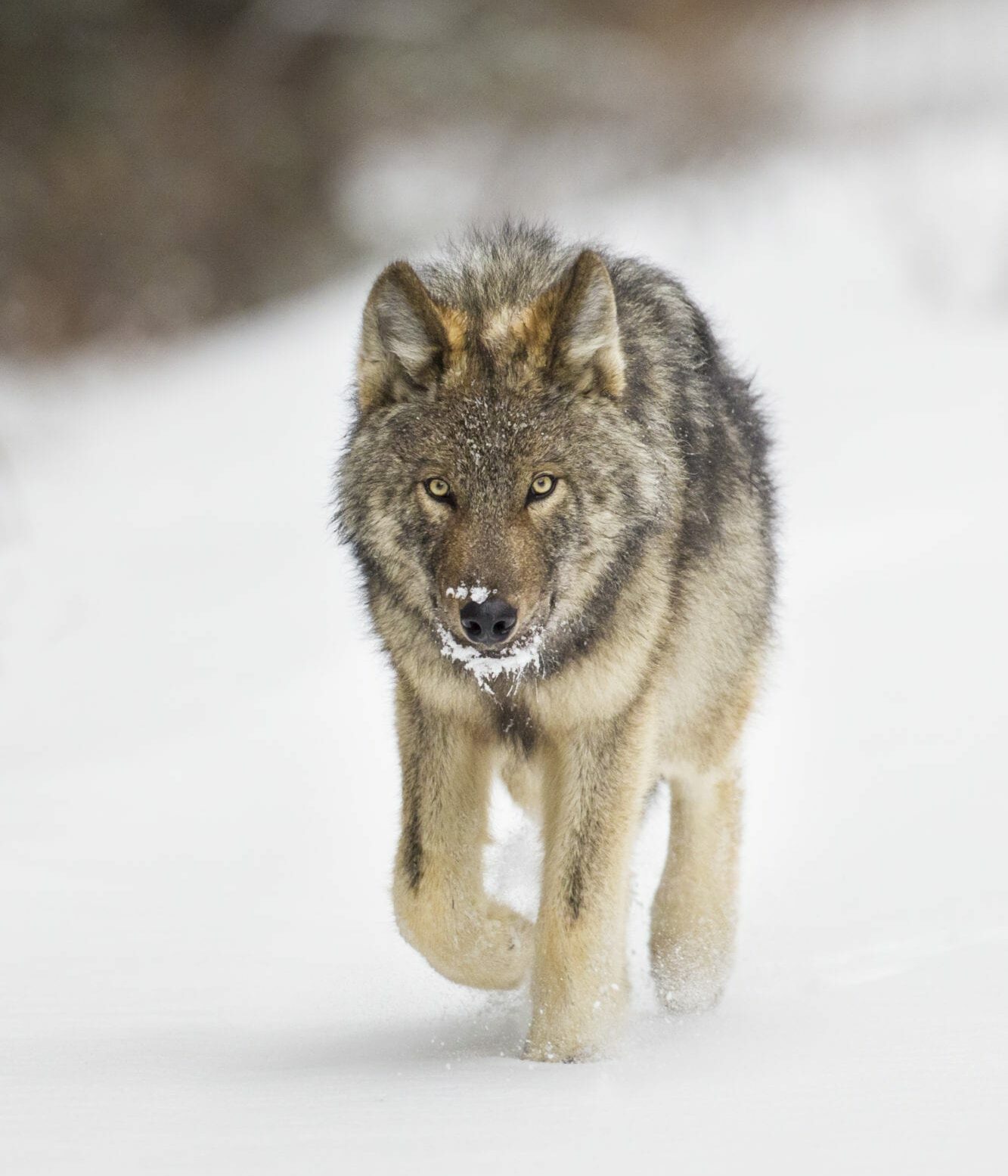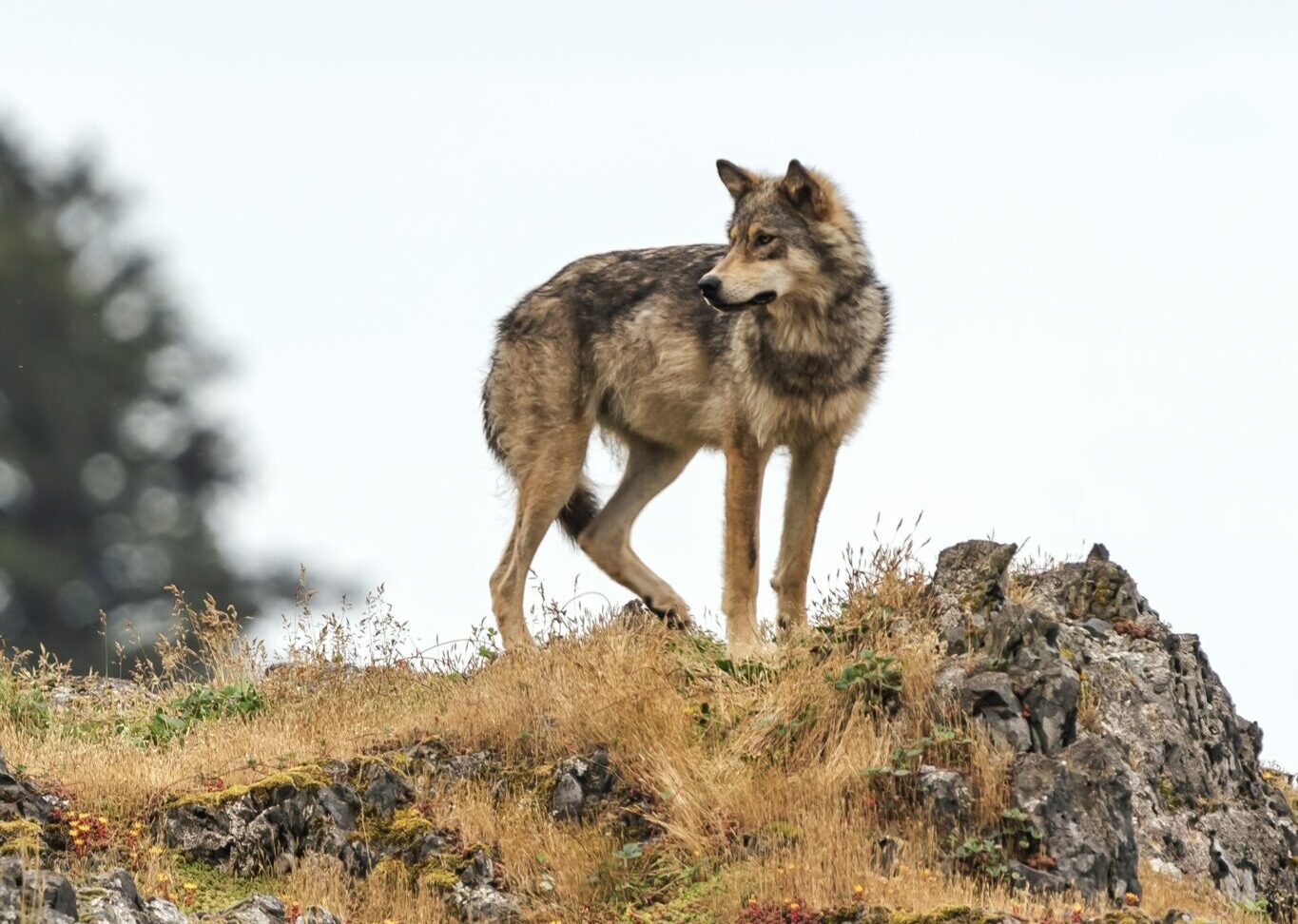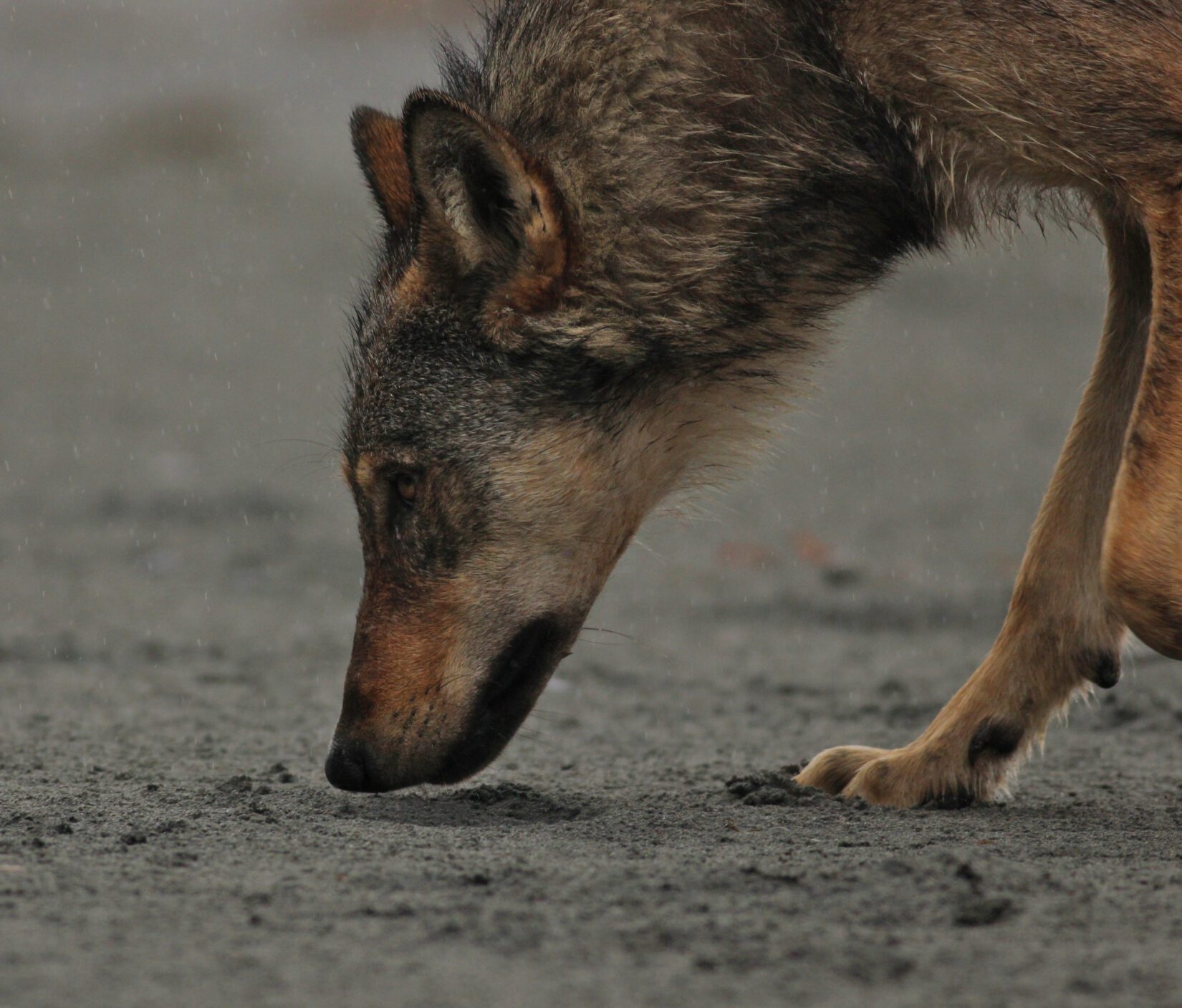Wolves are an icon of the Canadian wilderness, but they are also one of the most persecuted animals in North America. For centuries, wolves have been trapped, hunted and poisoned by humans.
Wolves are intelligent animals, with complex and well-organized social structures. They form close bonds with their pack, usually made up of a dominant male and female, and their pups from current or previous years. They are an essential part of our ecosystem, keeping natural prey populations healthy.
Ungulates – like deer, moose, elk, and caribou – are the majority of a wolf’s diet. They will also eat smaller animals like rabbits and hares when needed. The pack has to work hard to eat. Together, they make a kill only every couple of days. On average, they kill one large mammal for every 10 they chase. The packs have large territories, often 50 to 300 square kilometres or more.
Wolves are often killed in the name of protecting other species, but human activities are the root cause of conflict and imbalances, and it’s up to us to find ways to coexist.
B.C.’s wolf cull
Damage and disruption to caribou habitat have resulted in population declines, most notably in woodland caribou. In response, the provincial government is using “predator reduction” as one of their primary caribou recovery actions. British Columbia’s wolf cull has been happening since 2015. Wolves are killed by contractors using aerial gunning from helicopters.
This program lacks scientific justification as a solution to declining caribou populations, and is unlikely to be humane using aerial methods. The BC SPCA opposes culls that do not meet the seven international consensus principles for ethical wildlife control.

Problems with the wolf cull program
The BC SPCA is opposed to the wolf cull for the following reasons:
- The cull isn’t based on objective science: Studies supporting wolf control have flaws in their analyses. Wolf culling and maternal penning treatments explained caribou population recovery no better than habitat alteration or random chance. Culling efforts to date have resulted in few, if any, measurable benefits for caribou.
- Humans, not wolves, are to blame: Damage and disruption to caribou habitat is the key factor in caribou population decline. This includes logging, oil and gas development, and even recreational activities like snowmobiling and off-roading. Human activities fragment caribou habitat, and wolves take advantage of human-caused disturbances to move through caribou habitat more easily. Restoring disrupted habitat features (e.g., roads and seismic lines), without killing wolves, is effective at reducing wolf encounters with caribou.
- Killing from helicopters with little or no ground support isn’t humane: Both the AVMA and CCAC recognize that gunshot is acceptable for killing free-ranging wildlife. However, this is under the condition that the bullet targets the brain, noting placements to the heart or neck are challenging for accuracy and a humane death. These shots are challenging to achieve and require skilled shooters with ground support to confirm death is quick and without suffering. Culling can also fracture pack social structures when not all individuals are killed at once, and collaring survivors to involuntarily betray their kin (“Judas wolves”) is not ethical. Culling predators can also create an ecological imbalance for other species in the area.
- The cull conflicts with Indigenous traditional values: The Union of BC Indian Chiefs (UBCIC) has called for an end to the wolf cull program and instead prioritize reduction of resource development to protect caribou. In a letter to the Minister of Forests, Lands and Natural Resources, they stated that “Habitat destruction, not wolves, are responsible for the decline in caribou species. (…) This is in direct opposition to Indigenous traditional values, reciprocity with our animal relatives and our inherent Title and Rights Holders as the stewards of our lands, and impedes on our legal orders and jurisdiction over our territorial lands.”
There is little evidence that removing all wolves in the area has or will allow the caribou population to recover and stabilize. Instead, intensive carnivore removals have the potential to cause severe and disruptive trophic effects.
BC SPCA chief scientific officer Dr. Sara Dubois co-authored a 2013 study in B.C. (PDF) that found a majority of wildlife professionals and the general public did not agree that killing one species to save another (even if endangered) was ethical. In a 2019 book chapter, Dr. Dubois also notes this strategy does not solve the problem when habitat is at risk – but taxpayer-funded culls are quick and cheaper than protecting or restoring habitat. Without reducing habitat fragmentation and human disturbance, the damage may already be irreversible.

Key actions against the wolf cull
In 2020, Pacific Wild initiated a legal challenge over the methods used by government contractors to kill hundreds of wolves each year, arguing the program was operating in violation of the Wildlife Act. Unfortunately, the B.C. Supreme Court ruled against the challenge in 2022.
In fall 2021, the province sought feedback on a five-year approval for continued wolf killing. The BC SPCA submitted feedback, calling for an end to the cull and in January 2022, the results of the engagement survey were released. Not surprisingly, nearly 60% of respondents opposed culling wolves as a measure to protect caribou. The top three recovery actions preferred by respondents were habitat protection, restoration and management. Unfortunately, B.C. renewed the wolf cull program for another five years despite this clear opposition and a lack of action to protect caribou habitat.
In 2022, The Fur-Bearers obtained reports from wolf cull contractors via a freedom of information request. These reports detail contractors collaring wolf pups, killing their packs, and then tracking the wolf pups to kill them at a later date. These “Judas Wolves” involuntarily betray their kin into being killed, before they are also killed. The Ministry withheld photographs as part of the reporting documentation requested, and The Fur-Bearers subsequently submitted a complaint regarding the Ministry’s monitoring of the wolf cull to ensure standards are being met.

Key actions against predator poisoning
In 2019, the BC SPCA submitted a thorough evidence-based assessment criteria (PDF) to Health Canada for humaneness to be included when evaluating product approval, including predacides like strychnine and Compound 1080. Unfortunately, they announced in 2021 that humaneness would not be used in their criteria to assess what poisons should and shouldn’t be allowed.
In 2021, the BC SPCA asked the Canadian public to sign the federal e-petition 3047 to end the use of strychnine, Compound 1080, and sodium cyanide for killing wolves, bears, coyotes, and other large vertebrates. These poisons are widely acknowledged as inhumane causing intense suffering and pain, and result in the poisoning and death of non-target animals. It is illegal to poison wildlife in B.C. without a permit. The use of these poisons is allowed under federal permits, and while not used currently in B.C., their use is well known in Alberta and Saskatchewan.
The petition received 8,929 signatures from Canadians across the country to call on the federal government to ensure wolves, coyotes, and bears are protected from inhumane deaths. The petition was read in the House of Commons in May 2021. The use of sodium cyanide is no longer permitted, as this product has been cancelled by the manufacturer. The use of strychnine and Compound 1080 have been awaiting re-evaluation, and a public consultation period was held in fall 2022.
In 2024, Health Canada announced a complete ban on strychnine use in Canada, with all uses being illegal by September 7, 2024. While this decision is a positive outcome for animal welfare, this ban does not apply to Compound 1080, which is still legal for use in Canada. The BC SPCA filed a Notice of Objection against the continued registration of Compound 1080 and to advocate for the ban of this harmful product. We are awaiting a response to the Notice of Objection.
Ways to help
- Contact your local MLA to voice your opposition to the wolf cull.
- Support our allies working on the ground to protect B.C. wolves like The Fur-Bearers, Pacific Wild, Raincoast Conservation Foundation, Wolf Awareness and WeHowl.
Take action for animals
Want to be the first to know about actions you can take on behalf of animals? Subscribe to receive Action Alerts to keep up to date on our animal advocacy initiatives.
The BC SPCA uses your personal information to update you on our work for animals as well as for advertising and analytics purposes. More information on uses and how to opt-out can be found in our Privacy Policy.
